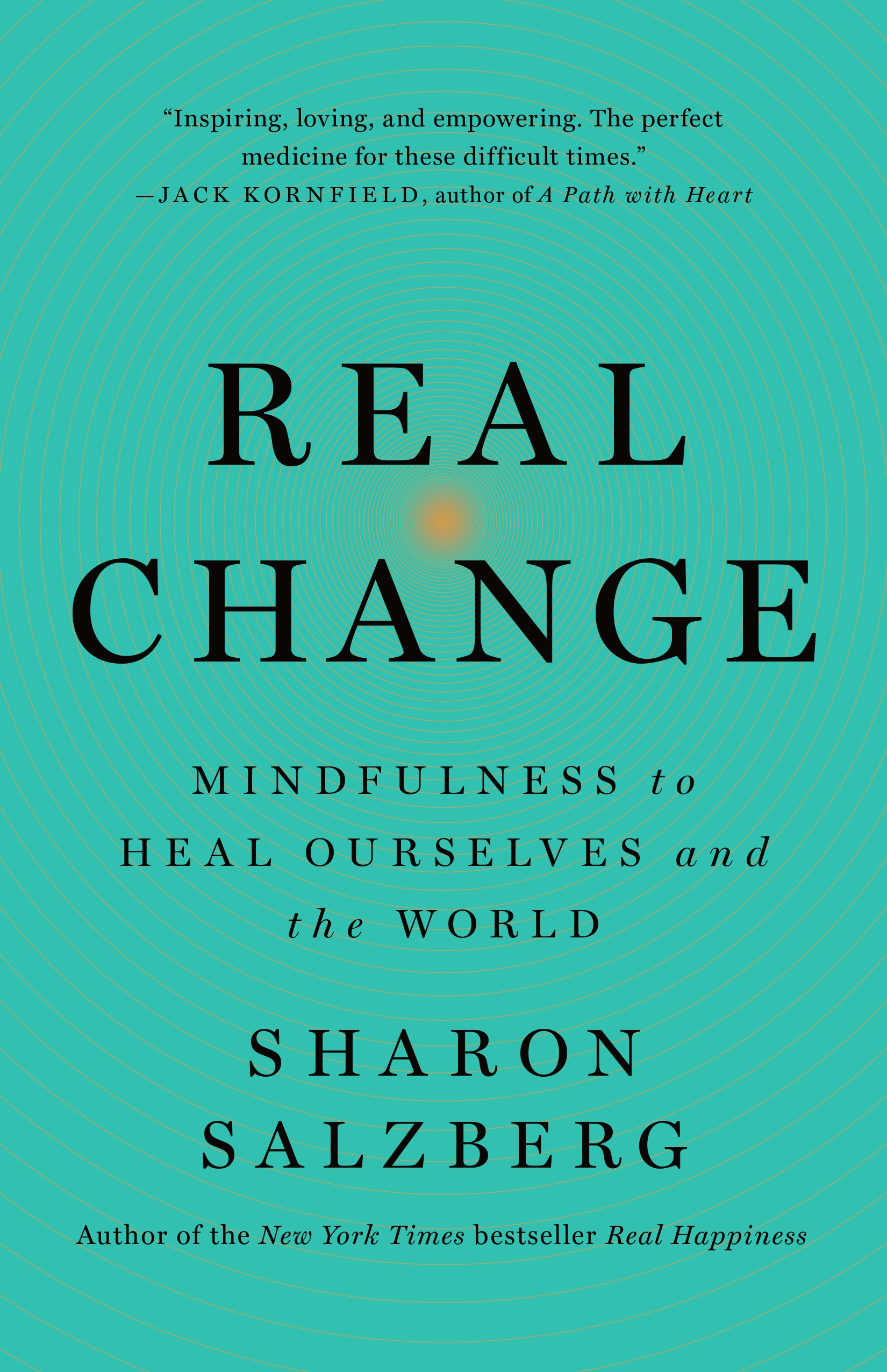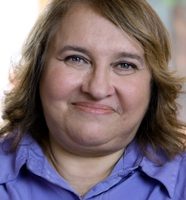View this post on Instagram
~

Sharon’s one of our favorite mindful voices for loving-kindness—the root of empathy, and helpful activism. Excerpted from Real Change, copyright © 2020 by Sharon Salzberg, with permission from Flatiron Books. Get the book here.
~
I’ve spent the last four decades working to help people cultivate the inner capacities of mindfulness and lovingkindness through meditation and other methods.
I know meditation is sometimes seen as a purely internal and esoteric practice, deeply spiritual and with positive repercussions for the practitioner, but nonetheless quite separate from day-to-day life—a retreat from life’s pains and struggles. We think of gurus on mountaintops and disciples cloistered away in ashrams and caves, living pure, almost disembodied existences.
More and more people use mindfulness and compassion practices these days, moved by their reported influence on the nitty-gritty hurdles of day-to-day life. I’m not sure how many of those people would assert that these methods affect more than themselves and their immediate circle. But I do know that the outcomes of lovingkindness and mindfulness meditation practices can be foundations for engaging in the world in large, bold ways that are also realistic and sustainable.
In the face of struggles for social justice, for making the world a better place even when the times feel daunting, mindfulness and lovingkindness practices can help provide us with the tools we need to navigate the emotional and conceptual terrain that comes with seeking to make change.
Sometimes these practices are seen as promoting the opposite of a commitment to social change; they’re regarded as a sort of soporific we can imbibe so that we can feel good no matter what’s going on around us. We can half snooze through life rather than engage with the suffering of others, or even of ourselves. That view of a meditative life paints a fuzzy, sepia-toned picture, a parallel to the disconnected freeze effect in the collection of fight, flight, or freeze stress reactions. It all seems so vague! So removed! So…numb!
Bhikkhu Bodhi, an American born in New York City in 1944, was ordained as a Buddhist monk in Sri Lanka in late 1972. He lived in Sri Lanka for almost twenty-four years. For most of his monastic life, he pursued scholarship and translation, as well as practicing and teaching meditation.
In the last decade or so, following his return to the United States in 2002, he has increasingly turned to activism, speaking out about hunger and climate change and girls’ education, among other matters. Although he was politically active in his college years, once he became a monk, he felt working on himself and learning the legacy of the ancient tradition was most important.
However, he said recently, “I came to feel and to believe that our way of interpreting and applying Buddhism has to adjust itself to the dominant ethos of the age in which we’re living, and to the vital and crucial needs arising from the conditions under which we’re living.” In other words, he came to feel that the conditions of our time require a robust response that reflects our inner values writ large as we look at the legacy of our societies, our priorities, our choices.
The truth is, meditation would not be as meaningful for me at this time in my life if it were just about me. For my part, my experience practicing, studying, and teaching mindfulness and lovingkindness meditations is that they work to:
>> build a quality of resilience that can shore us up for the long haul;
>> help clear our minds to make better choices, with strategies based on the values we want to live by;
>> teach us how to be with feelings of loss or frustration or pain in a way that’s healing and onward leading, instead of devastating;
>> help us focus our energies more productively and relieve the exhaustion of finding too many battles to fight;
>> join forces with others more effectively and harmoniously;
>> transform how we see ourselves, those we work with, and those whose decisions and actions we work against; and
>> lighten and open our hearts as we cultivate the power of connection.
These practices also help me remember what I most care about and allow me to keep going in the face of adversity or criticism. In late June 2018, for example, I helped coordinate a minute of metta (lovingkindness) for children being held in detention. These kids, some as young as under a year, had been separated from their parents who were seeking asylum at the U.S. border. Though asylum-seeking is considered a legal form of entry, our government representatives were treating it—in action and in rhetoric—as though it were a terrible crime for mothers or fathers to flee war, hunger, and domestic violence in search of a better life for their children.
Reading about and seeing videos of these frightened children, seeing their parents desperate to be reunited, simply broke my heart, so I publicized the minute of mindfulness through Twitter at #mettaminute.
Some people who responded were very positive, grateful for a way to not feel so alone, to have a reminder that this heinous practice was ongoing and we couldn’t afford to look the other way. Several wrote about how exhausted they were by their own outrage and felt they needed another way to respond that incorporated love. Others urged me to stop leading the meditation and instead donate to an organization working directly with those families. (I already had donated.) Some chided me and gently tried to steer me toward other forms of action, instead of what they saw as a mollifying, self- soothing, self-serving exercise. A few were more strident than that, deriding me for wasting people’s time, describing me as ineffectual and stupid, “as bad as the people who send thoughts and prayers after a mass shooting, instead of working on things like background checks for people buying guns.”
I responded first with this tweet: “I offer metta (lovingkindness) to those in ICE detention centers to remind myself not to disconnect. And because I remember what it was like as a child to feel abandoned. It’s so much less painful to look the other way, but this is vital.”
How do we keep witnessing the pain, especially if it is so evocative of the most difficult times in our own lives?
After the more dismissive or angry tweets started arriving, I wrote again, “I would never suggest meditation, prayer, positive thoughts as a replacement for action. But I know I need to connect to something bigger, repeatedly, to have energy to keep acting.”
How do you keep going in your efforts toward change, when immediate success is not in sight, when you’re awfully tired, when you’re frustrated? Do you have a refuge in something bigger than the current circumstance? Where can we connect to something larger than what’s in our immediate experience, larger than the small-minded views the world may be pulling us toward? How can we remember to reside more often within this bigger vision?
I’ve had the good fortune to meet Shantel Walker, thirty-five, who has worked for Papa John’s Pizza in Brooklyn for almost twenty years, enduring erratic hours and unlivable earnings. Finally, she got fed up and joined strikes and street protests that brought national attention to the plight of the nearly four million people working in the United States in the fast-food franchises that are American icons. In 2013, she joined Fight for $15—a nationwide movement that later succeeded in increasing the minimum wage in New York City and elsewhere. She continues to volunteer in off hours for Fast Food Justice and Fast Food Forward, non-profits that work for the betterment of fast-food workers. At one point, she lost her job for five months because of organizing, but she said no punishment is worse than the punishment of a wage you can’t live on.
Shantel works day in, day out to serve people pizza, and she is also a visionary. In an interview for this book, she told me:
A lot of people don’t get ahead in society because they are only worried about themselves. Sometimes, you’ve got to not worry about yourself so much. You’ve got to worry about mankind and humanity, you’ve got to think if we don’t all do something today, what is tomorrow going to bring? If I can’t live on what I’m making now, how will it be for these kids around here in the next five or ten years? Will it get any better if I just sit here worrying about my own situation alone?
Why are we doing what’s wrong? Why are we listening to someone who is doing bad, why are we accepting it and not saying anything? If we say nothing, we are just as much in the wrong. We’ve just got to do better as people.
~
Excerpted from Real Change, copyright © 2020 by Sharon Salzberg, with permission from Flatiron Books. Get the book here.
~
Relephant Bonus:






Read 3 comments and reply